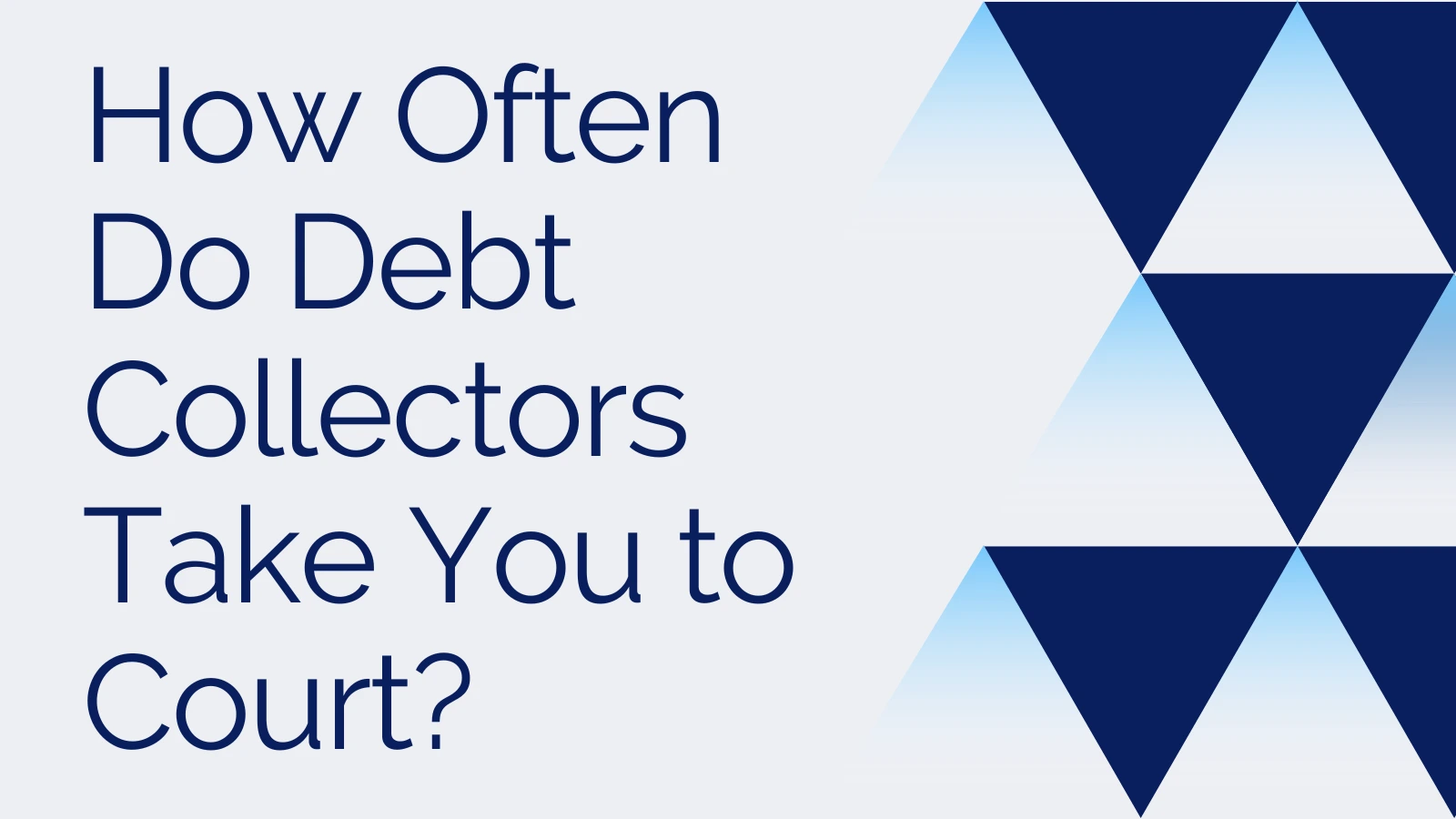How Often Do Debt Collectors Take You to Court?
Getting taken to court over unpaid debt is the last thing anyone wants. Yet debt collectors do haul consumers into court seeking judgments fairly often. Understanding how and why collectors sue, and your chances of being sued based on your situation, makes it less intimidating. This guide will cover everything you need to know about debt collectors taking people to court.
Why Debt Collectors Take People to Court
To Get Judgments Against Consumers
The number one reason debt collectors file lawsuits over debts is to secure legal judgments against consumers. Having a court judgment for what someone owes gives the collector more leverage to get paid. It also opens up more aggressive collection methods they can use to forcibly collect if the consumer still won’t pay voluntarily.
To Have More Collection Tools Available
Once a creditor gets a judgment against someone that says they officially owe the debt per the court, many more collection tools become available. These can include wage garnishment, bank account levies, property liens, or seizure of assets. Collectors can also damage credit and tack on court fees and interest to the balance due.
When Settlement Negotiations Fail
Typically before suing, the debt collector will attempt to negotiate settlement offers and payment plans. Lawsuits often happen when consumers won’t agree to reasonable settlement terms, or they default on arrangements. Creditors decide the potential judgment is worth more than what they may have collected otherwise.
When will a debt collector sue?
A debt collector will sue for unpaid debt when it believes it has a good chance of collecting that debt. Some attributes may be whether there are assets that have positive equity such as property, the amount of the debt owed, state laws regarding garnishment, and the statutes of limitations.
How many accounts am I past due on? The more accounts I owe the higher the chance one may sue me.
How is my debt proportioned? Do I owe all my credit cards and loans to one bank or is it spread out?
Is the creditor I owe most of my debt to local or small (credit unions)? Also, do they have more of a vested interest to sue me because they are a smaller bank (personal relationship)?
How often do creditors I owe have access to my assets?
Do I have checking, savings, or investment accounts with the creditors I owe? Can they see my transactions?
Do I have equity in assets that banks can calculate based on what’s reporting to my credit report?
Will a collection agency sue for $5,000?
This is probably one of the most common questions we see is whether a collection agency will sue for just $5,000 or less. The answer is often that it depends on the collection agency. You will notice in our comprehensive reviews covering Midland Funding LLC and Portfolio Recovery Associates that you may be sued for as little as a couple of thousand dollars. I have also seen that a collection agency may not sue for much more than that amount.
How do you know if you will be sued for $5,000 or less?
It may be difficult to determine whether the collection agency you are working with will sue for $5,000 or less, but you may want to look at a few things to determine whether you may be sued. A company’s policies constantly change, so this should be viewed as an estimate, but it may be helpful to consider.
Does the company have a history of suing? You may be able to search on Google to find this information.
Is the collection agency a law firm or just a collection agency?
Is the collection agency a large or small collection agency? As Portfolio and Midland are some of the biggest collection agencies in the United States, you can understand that they have efficient operations that allow them to sue for less and still be profitable.
What are my options before being sued and after being sued?
First, you can try to settle the debt on your own. See how to settle credit card debt before going to court to make sure you are informed. When you settle the debt on your own, you can save on fees that would be paid by hiring a firm to do it.
Second, you may compare your options if you have multiple debts that are outstanding or if you cannot afford the debt for another reason. For example, oftentimes, a bankruptcy clears judgments. What should you do? It depends. There are 5 main options, so we build a debt relief comparison calculator below to help you do the following:
Estimate the all-in costs for EACH option.
Estimate the length of time for EACH option.
Shows pros and cons for EACH option.
Uses your city and state for each of these estimates.
Provides reputable providers in your area for different options.
Steps Before Suing for Debt Collection
Before heading straight to court over debts, ethical collectors take multiple steps attempting contact and negotiation first.
Sending Letters and Making Calls
As soon as an account gets placed with collections, agencies start sending letters requesting contact. Collectors also call consumers asking for payment arrangements. The letters and calls continue seeking engagement on settling outstanding balances.
Validating the Debt
Early in the process, collectors send debt validation notices too. These letters validate that the consumer owes the specific debt, and provide details like the creditor’s name, balances due, account numbers, etc. Consumers have rights to dispute invalid debts at this point.
Reporting to Credit Bureaus
Reporting debts owed to the credit bureaus also typically happens at the start of collections. This negatively impacts credit scores hoping to prompt consumers to address debts. Unpaid collections stay on reports for up to 7 years.
Making Settlement Offers
Before considering legal suits, most professional agencies try making reasonable settlement offers first. These can be lump-sum discounts to help resolve account balances sooner rather than later. If consumers engage, lawsuits often don’t happen.
Can I be sued while in a debt settlement program?
Yes, it is possible to be sued while in a debt settlement program. So, before you join a debt settlement company, it can be helpful to ask specific questions about lawsuit likelihood.
You can also check our guides covering why people may have had a negative experience with National Debt Relief or Freedom Debt Relief, two of the larger debt settlement companies.
Certainly, when resolving your debt through a debt settlement program, there is always a risk your creditors can pursue collection through legal attorneys.
What happens if I am sued while in debt settlement?
Once an account goes to a legal attorney licensed to collect debt in your state, the first thing that will usually happen is you receive a pre-legal letter validating the debt owed. To clarify, this is the attorney advising you that the debt has been placed in their office and they could pursue a judgment. At that time you are not being sued, and the account can still be resolved for a portion of what’s owed. Depending on the aggressiveness of the attorney and a valid hardship, results can vary from reasonable settlement percentages (50%) all the way to paying 100% of the debt plus attorney’s fees. But, this is all before going to court or being served to appear in court.
If an attorney decides to move forward with pursuing a judgment the next thing you will receive are legal documents (Lit Docs) with a scheduled court date (you must be served these documents, review laws on being served in your state). If arrangements are not made with the attorney’s office before the scheduled court date, an individual may represent themselves or be represented and fight the account in court. Outcomes vary when accounts go in front of a judge. Based on experience, judges can be very lenient if you show up to court and give a valid reason why you can only pay a portion of the debt or make arrangements on the balance that fit your current budget. However, at any time before going to court you can try to make arrangements to resolve a balance.
Some individuals may cancel their debt settlement program if they are sued and consider alternative options such as bankruptcy. For example, some individual may consider how to cancel National Debt Relief or how to cancel Freedom Debt Relief if they are enrolled in those programs.
You may consider reviewing all of your options in the case when you are sued via debt settlement by taking a Chapter 7 Means Test Calculator to estimate qualification or Chapter 13 Calculator to estimate your monthly payment plan. These calculators also allow you to compare all of the different relief options.
Debt settlement arrangements that are usually available are: If you are enrolled with Americor, Credit Associates, or other debt relief companies, consider asking them to try to settle the accounts directly even if you are sued.
Debt Settlement – Paying a portion of what’s owed in a lump sum or overpayments. Fortunately, we wrote an extensive article on debt settlement to provide you with insights into how it works and the pros and cons of this solution.
Stipulation Judgment Settlement – Pay a portion of what’s owed, but if the agreement is not met the attorney automatically retains judgment without having to go to court. Although, you lose the ability to fight the account in court.
Payments towards the balance – Pay the full balance over time with payments that fit your budget and the attorney agrees with.
Stipulation Judgment payments towards the balance – Pay the full balance over time with payments that fit your budget and the attorney agrees with. If the agreement is not met, the attorney automatically retains judgment without having to go to court. You lose the ability to fight the account in court.
How Do I Deal With Debt Collectors When I Cannot Pay?
You have rights under the Fair Debt Collection Practices Act, and there are options when you have debt collectors contacting you and you cannot pay. See our guide: How to Deal With Debt Collectors When You Can’t Pay.
Also, you can use this 11 word phrase to stop debt collectors from calling you to give you time to think and consider your options. You can also ask that the debt collector not email or text message or send you letters going forward.
You could ask the debt collector to stop reaching out in writing using our free template. This template will help stop debt collectors from contacting you. It can also validate your debt and dispute your debt if you would like.
If the debt is also not valid, you can consider validating/disputing the debt. For this, you can use Solo Suit which helps you generate a letter to dispute the debt, allows PDF download and mail instructions.
Dispute/Validate The Debt
Can I be Garnished If A Judgement Has Been Granted Against Me?
There are four main ways that an attorney or debt collector can attempt to collect from your once they get a judgment against you:
Wage garnishment of a paycheck
Levy/garnishment of a bank account
Lien on property or assets – Home mortgage
Continue normal collection practices
However, you can still try to settle if a judgment has been retained but you haven’t been garnished or levied yet. Usually, there’s a grace period before an attorney will start executing judgment because they need to notify an employer or bank, and that can take time. In conclusion, certain states allow attorneys to use all of the above tactics, others may only allow one. Therefore, it’s important to review judgment laws in your state to know how an attorney can pursue collection once they have retained a judgment. You may be wondering the difference between a levy and a lien, which is important to understand.
You can take the following wage garnishment calculator based on your state below to help you understand the different rules related to debt statutes and wage garnishment.
Statute of Limitations
The Statute of Limitations is defined as the deadline for a lawsuit. Your creditor most likely knows these statutes and takes this into consideration when deciding when to sue for unpaid debt.
| State | Years | Statute |
|---|---|---|
| Alabama | 3 years | Title 6 Ch.2 Sec. 37 |
| Alaska | 3 years | 9.10.053 |
| Arizona | 6 years | HB 24121 |
| Arkansas | 5 years | 4-3-0118 |
State Garnishments, Levies, and Vehicles
Three of the primary tools that collectors will use to try to reclaim debt are wage garnishment, levies, and vehicles. More information can be found below broken out by the state.
| State | Wages | Vehicle | Bank Account |
|---|---|---|---|
| Alabama | 75% | None | $3,000 |
| Alaska | $456-7161 | $3,900 | $1,820 or $2,860 |
| Arizona | 75% | $5,000 | $150 |
Summary
Many individuals want to pay off debt but cannot do so due to financial hardship. Some creditors will sue to try to receive the funds for that debt. Getting sued can be stressful and can potentially lead to a garnishment or levy. Use the lawsuit likelihood calculator below to estimate the chance you would be sued for debt.
FAQs About Debt Collector Lawsuits
How Much Do I Have to Be in Debt to Be Sued?
There’s no single threshold, but collectors tend to sue over individual debts greater than $1,000 or accumulated unsecured debts totaling above around $5,000. The larger the balances relative to your income, the higher risk. $10,000+ is very likely to prompt litigation with no payments.
How Long Before My Debt is Too Old to Sue Over?
The statute of limitations on debt lawsuits ranges from 3-6 years. Debts 2-6 years delinquent are riskiest, while those past your state’s time limit usually cannot be sued over. However, restarting payments can effectively “reset the clock” on older debts otherwise soon barred from litigation.
Should I File Bankruptcy if a Debt Collector Sues Me?
Bankruptcy instantly halts any collection lawsuits against you, discharging qualified debts. It also negatively impacts your credit and finances for years, so first discuss options like judgment settlements. But if you have very limited income/assets and high unsecured debts, bankruptcy may be your best route after getting sued.
What Percentage of Debts End Up In Court?
A small fraction- experts estimate only around 4-5% of unpaid consumer accounts are ever litigated in court. Most collectors either write off smaller debts under a few thousand dollars or keep attempting to secure voluntary repayment from the consumer instead of suing.
What Percentage of Court Cases Do Debt Collectors Win?
Creditors win the vast majority of debt lawsuits- estimated around 90-95%. Most cases end in default judgments because the consumer fails to respond to the lawsuit properly. Of cases where the consumer disputes the debt, collectors still prevail about two thirds of the time according to research.
Can debt collectors really take me to court over small debts under $500?
Yes, debt collectors absolutely do sue consumers for relatively small unpaid balances often less than $500. The risks increase when you owe money to smaller local creditors, or if you ignore validation notices. It depends partly on state lawsuit costs too.
Should I try calling back debt collectors who are threatening to sue me?
If any collector threatens legal action, you should promptly call back attempts to settle matters and resolve the debt. Communication and arranging payments could prevent actual lawsuits. Keep documentation of all discussions and payment arrangements in case suits get filed anyway.
Is it too late to settle once court papers have already been served for a debt?
No, it’s still possible to contact the plaintiff’s attorney before your given court date and discuss discounted lump sum settlements or payment plans to satisfy debts. This minimizes additional legal fees and interest if a judgment got ordered later on.
What should I do if I think I don’t actually owe the debt I’m getting sued for?
Carefully review the validation information served with your lawsuit paperwork detailing the debtor name, account details, balances due, etc. If you have reason to believe debts are mistakes, identity theft, or already rectified/paid, gather any evidence proving the debts invalid, then contact consumer defense attorneys.
Is Chapter 7 bankruptcy a good solution to stop debt collector lawsuits?
For qualified filers meeting income limits unable legally unable to repay debts, Chapter 7 bankruptcy can immediately halt lawsuits and discharge eligible debts entirely with no payments ever due. Just be sure you pass means testing first and receive budget/credit counseling before courts grant discharges canceling debts.






